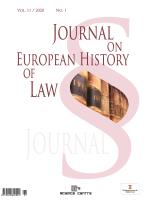The Formalistic Pattern of Soviet Civil Codification as a Chapter in European Legal History
The Formalistic Pattern of Soviet Civil Codification as a Chapter in European Legal History
Author(s): Dmitry PoldnikovSubject(s): History, Law, Constitution, Jurisprudence
Published by: STS Science Centre Ltd
Keywords: codification; Soviet law; civil code; legal formalism; legal style.
Summary/Abstract: Many European and even some Russian academics consider Russian legal history to be a series of ruptures. There is some truth to this, and yet the law in east of Eastern Europe is not devoid of continuities which link it with European legal trajectories. This paper examines the pattern of the codification of civil law as one of those links. Russian experience with drafting civil codes goes back to the ‘age of codifications’ and culminates with the ‘normal’ draft Civil Code of the Russian Empire of 1882–1913. After the Bolshevik revolution of 1917, Soviet civil legislation claimed to break away from all continuity with the bourgeois legacy, domestic and foreign. However, even the codification of ‘real socialism’ in the early 1960 s reveals notable similarities with the ‘bourgeois’ legal experience. The theoretical concept of the Civil Code of 1964 overlapped with the modern notion of the code during the ‘age of codification’. This similarity was backed up by the positivistic legal scholarship that conceptualized Soviet law as a hierarchical and gapless system of binding norms. This part of the Soviet legal legacy still marks the Russian Civil Code of 1994-2006. Hence, the formalistic pattern of codification remains one of the Soviet relics in contemporary Russian legal style and allows a comparison with other civil law jurisdictions in Europe.
Journal: Journal on European History of Law
- Issue Year: 11/2020
- Issue No: 1
- Page Range: 53-60
- Page Count: 8
- Language: English
- Content File-PDF

